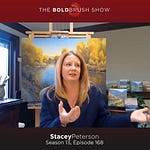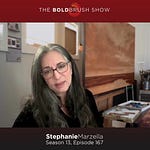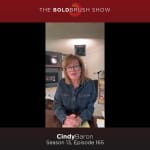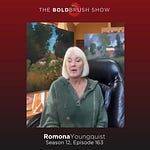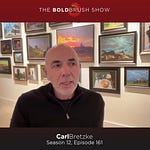Show Notes:
Learn the magic of marketing with us here at BoldBrush!
https://www.boldbrush.com/
Get over 50% off your first year on your artist website with FASO:
https://www.FASO.com/podcast/
Order your exclusive da Vinci BoldBrush paintbrush set!
https://brushoffer.com/collections/boldbrush
---
In this episode, we feature a compilation of advice from artists who have successfully made the leap into becoming full-time creatives. They share their journeys, offering practical tips on transitioning from part-time to full-time artistry and how to build a sustainable career. You'll hear about the importance of figuring out what you love to paint, developing thick skin, and finding the right balance between passion and practicality. The artists also discuss the importance of being seen, persistence, and creating multiple income streams to ease the pressure off of creation. From overcoming self-doubt to setting realistic goals, this episode covers key advice for anyone considering the transition.
Episodes mentioned:
56 Pavel Sokov
69 Scott Burdick
74 Arthur Gain
78 Vicki Sullivan
79 William Schneider
95 John Lasater IV
96 Brienne Brown
97 Elizabeth Robbins
98 Warren Chang
100 Kevin Macpherson
---
Transcript:
Pavel Sokov: 0:00
But you know, the brave. The brave are the ones that get lucky. The most, you know,
Scott Burdick: 0:06
my best advice is taking the pressure off yourself, however you can.
Brienne Brown: 0:11
He said. He was like, Well, you know, just paint and it'll come. And I was like, Oh, that is so not helpful.
Warren Chang: 0:21
Whatever it is the art that you think is beautiful, that you that the reason why you became an artist, try to create that art.
Laura Arango Baier: 0:30
Welcome to the BoldBrush Show, where we believe that fortune favors a bold brush. My name is Laura Arango Baier, and I'm your host. For those of you who are new to the podcast, we are a podcast that covers art marketing techniques and all sorts of business tips specifically to help artists learn to better sell their work. We interview artists at all stages of their careers, as well as others who are in careers tied to the art world, in order to hear their advice and insights. In this episode, we feature a compilation of advice from artists who have successfully made the leap into becoming full time creatives, they share their journeys, offering practical tips on transitioning from part time to full time artistry and how to build a sustainable career. You'll hear about the importance of figuring out what you love to paint, developing thick skin on finding the right balance between passion and practicality. The artists also discussed the importance of being seen persistence and creating multiple income streams to ease the pressure off of creation, from overcoming self doubt to setting realistic goals, this episode covers key advice for anyone considering the transition. I think
Pavel Sokov: 1:35
what I would say is one of the things that really helped me get my career going, like literally within six months of trying. It was close to 10 years ago now that I started my career. I quit my business office job and moved to California to learn oil painting, and I got kind of going right away. And when I asked myself, Why is that? Why was it fast? It's a combination of a luck, which you need. But you know, the the brave, the brave are the ones that get lucky the most you know. So I found that I went after and took on different projects that at that time I was a little bit too green for. I didn't quite know if I could execute this, this challenge, I did my first oil painting commission during my first semester at watts. A semester is three months there. So in my first three months of touching oil paint, I took on an oil painting Commission. It was from Reddit. I painted somebody's dog. Yeah, that's humble beginnings, from Reddits dogs to kings and things like that, but you have to start where you have to start. But what is really important is to say yes to uncomfortable things that are a bit too soon, because I've seen other students at the time take the seemingly more logical strategy of not putting the card in front of the horse. So they would take things kind of slowly and logically in steps like they would take all drawing classes before doing painting classes. I, for example, skip drawing classes and took painting classes right away, and they would like, build up to things. And that's fine, that will work. But the brave thing to do is you don't build up to it. You just do it right away. You say yes to everything, and it's extremely stressful. And you get, like, literally, physically ill. I remember one time magazine, through sheer miracle and luck, contacted me to do the Time Person of the Year cover in 2014 it was my first six months of trying to be an artist. Wow. And I said yes, and I had like, 40 hours of class each week, and I had only two weeks to to get it done. And I remember when I realized that the email wasn't actually a scam, because I was convinced that it was some sort of, like phishing scam. When I realized it wasn't a scam, I just, like, turned green. Everyone's like, Do you have a fever or something? Because I realized I'm, like, I wanted it to be a scam, you know, so that I don't have to have the pressure and the pain of at the time, I felt a lot of stress, because I feel a. Responsibility upon myself. When somebody does a commission with me, it is extremely, intrinsically required for me to make sure they're happy and not because I care about them or I'm a good guy. Absolutely not and I'm not a good guy, I deeply want to be proud of myself as a person. And for that to happen, I needed to be true that working with me or doing something with me is something that every person will be happy and excited that they did I would never regret this is something I need that so that when I go to bed, I can say that I respect myself, yeah, not the client, not the client. Is the client, but if for me, so that pressure, when I would say to certain things early on, that personality, would put a lot of stress on me that actually I found made me learn faster, perform faster, and do leaps of artistic evolution very quickly, because you gave your commitment and you'd rather die than break your commitment or not be able To do something that you told somebody that you're able to do, so your brain just unlocks whatever resources are there that are required to make this happen. And I grew artistically very quickly, through a lot of stress and through a lot of like, hair falling out and stuff like that. I remember going to paint an MIT professor from life at her like mansion early on, and it was so challenging. The light was going everywhere. The pose was all changing. It was, it was so stressful, like I literally my hair started falling out faster. But through doing things like that, I literally feel nothing now. I feel absolutely nothing about anything. I have no stress. I don't know what, what kind of task they would have to give me, for me to experience some sort of like fear or trepidation at this point, and I think that was built through those early years of jumping into things without the safety on, you know, and the more stress and pain you feel, the better. I think, at least, look, I can tell you, that's how it was for me. We I recognize we all have different brains and different psychologies and different things that push us. Maybe some people grow better from positive reinforcement, whereas I grow from negative reinforcement exclusively. So take my advice to the grain of salt, and I guess, ask yourself if psychologically, what is right for you. But I can tell you that for me, discomfort was the the speed booster and the strength builder that I think made my life so much better, and made this whole thing go by quicker, and it allowed me to get to painting these paintings that I want to paint faster than otherwise
Scott Burdick: 8:39
I don't. I it's really difficult, because you have to just follow what you're interested in. And it's it is being an artist, being a writer, all sorts of things are, are very much a something that's not guaranteed. So if I go to work for somebody, if I go to work for DreamWorks or other places, then it's more guaranteed. And and people have different personalities. There are just incredible artists that work at the studios in different places, and some of them there, that's just their passion. They love being given a project and to work on. And then they, they, they, they do it. It's collaborative. So you have to kind of judge your own self, you know, I I just am not that kind of person. I really do like working on weird things, half of which don't sell, but enough sell. And so you have to look at your own self. Do I have the personality for this? Are you really driven to want to do your own things, or is it better to work for a place and then just not have that. Some people the stress of having to come up with money. I mean, especially we don't have kids. You have kids, you have all the sorts of expenses, it can be very stressful. So maybe it's not right for you to have the stress of trying to make a living. We have people who come to us and say, well, I need to make this amount of money. Point a year. How can I do that with being a painter? And sometimes you're just like, well, you know you're putting yourself under so much stress, you know that you're not going to be able to do your own work. Maybe it's better to do something else for your money and then do this for yourself, because that can be pretty stressful. So I think taking my best advice is taking the pressure off yourself however you can, whether it's another job and then do this part time. I mean, that's what I did with writing or moving places, if you can, like we move places to take the stress off us. I know that if I lived in a place that was very expensive, and we had lots of kids and things like that, I probably would have to have done more things to just make money. So there's, there's nothing wrong with that. That's a great thing, you know. And and even if I were to go work for films I love, like you said, I love spirit, I love those things, I would be happy working in places like that too. So it's, it's really hard to give specific advice, I think, trying to make it so you don't have too much stress with that put so much pressure on you that's always going to be the death of creativity. So
Arthur Gain: 11:19
Well, as, as I said, probably earlier, just to figure out what you really like, no matter how silly it is. I don't know maybe, maybe anything. Some people, they like to paint landscape. Other people they like like to paint figures. I'm sure there are people who can paint little dolls or small toy cars or anything, even even the most mundane, let's say subject can be turned into art. We can see it in the museums. All this still lives and things, but they look absolutely fantastic, and we can see how light is reflecting from the object. So, yeah, my recommendation is just to figure out what you really love and don't, don't shape yourself. Don't try to find something which is going to sell or to work or get likes on Instagram, because you never know and you will do something good, but something probably other people do. The same subject will get millions of likes, and you will get 10s, and it will just hit you hard. So recommend just to paint what you love. It will be very visible, because painting is, can we say alchemy, right? I know it's silly comparison and a lot of controversy, but painting is an alchemy for some reason, even from materialistic point of view, we can say that as alchemists of all times, we just mixing some metals, some pigments, some minerals, and we turn them into gold or just something valuable. But on metaphysical level, it is when you when you paint something which you really like, when it comes from inside it, it shows shows very fast, because painting is also about self confidence. If you do a lot of unnecessary brushstrokes or do things which are not really you, it will be visible in the painting. And vice versa, when you feel this alchemy inside of you, when this magic happens, when you are doing something which you really like, each brush stroke will be in place. Every mixture will be one step forward, not two step two step backwards, and it will be visible even on a small smartphone screen when people are just flipping through the Instagram or tick tock for in order to find some new entertainment or amusement. So it works even even like that regard. Needless to say, it works when people see your painting in real life, or the gallery wall or somewhere else I can so, yeah, just bait what you love.
Vicki Sullivan: 14:28
Well, I think that the most useful thing is to be persistent with social media. I must admit, I have sold quite a bit through online sales, whether it's social media or there's a few different online venues, and I think you really need to be constantly putting your work out there. You know something every day, something every day. You know whether. It's just something little or whatever, you have to be persistent. You can't just be once a week or something maybe a few times a week, but as long as you are persistent in keeping it so that people are seeing it, because you can be the most fantastic painter ever. But if you never put your work out there for people to see. Nobody's going to know about your beautiful work and where to buy it. So the main thing is, you've got to get it in front of people's noses so that they can actually see, you know. And I think I had this lovely man who commissioned me to do his portrait A while ago, and he gave me this little saying about persistence, and can I get I'll just grab it. It's over here, and I'll read it to you. Okay? So refused to accept failure. He sent me this. He's a lovely man. Nothing in the world can take the place of persistence, talent will not. Nothing is more common than unsuccessful men with talent, genius will not. Unrewarded, genius is almost a proverb, education will not. The world is full of educated derelicts. Persistence and determination alone are omnipotent. The slogan press on has solved and always will solve the problems of the human race. And so he was 84 when he commissioned me to paint him, and we've stayed friends ever since. It must have been about 10 years ago, I think, or more. And he sent me this little thing, which I he framed, and I have it in my studio to make me realize, you know, because sometimes when you know, you put your work in shows and you don't get accepted, and there's a whole lot of what's that syndrome, imposter syndrome, and the whole thing that you mentally go through. I read this about persistence. You know, refuse to accept failure, so just press on and don't give up and be persistent. I think that's the best advice that I've had. And so, you know, when it comes to you have to do the work, but you have to also learn about these new platforms, about social media and putting it out in front of people, and entering shows, entering competitions, anywhere that can get your work in front of people. I think that's probably, I think that would be my best advice. So just keep at it. And, you know, just be persistent about it. Don't just do a whole lot and then forget about it. You have to kind of do a little bit, do a little bit. Have I done a little bit today, you know? And, you know, sometimes I listen to podcasts about art and, well, podcasts like yours, and, you know, try and learn how other people do things, yeah, and just try and add to your knowledge about, oh, that sounds interesting. Maybe I'll try that. Or, you know, try different things. And, you know, be flexible. I suppose, Apple
Laura Arango Baier: 18:21
brush, we inspire artists to inspire the world, because creating art creates magic, and the world is currently in desperate need of magic. Boldbrush provides artists with free art marketing, creativity and business ideas and information. This show is an example. We also offer written resources, articles and a free monthly art contest open to all visual artists. We believe that fortune favors the boldbrush video, and if you believe that too, sign up completely free@boldbrushshow.com that's BOLDBRUSH show.com. The boldbrush Show is sponsored by FASO. Now more than ever, it's crucial to have a website when you're an artist, especially if you want to be a professional in your career. Thankfully, with our special ink FASO.com/podcast, you can make that come true and also get over 50% off your first year on your artist website. Yes, that's basically the price of 12 lattes in one year, which I think is a really great deal, considering that you get sleek and beautiful website templates that are also mobile friendly, e commerce, print on demand in certain countries, as well as access to our marketing center that has our brand new art marketing calendar. And the art marketing calendar is something that you won't get with our competitor. The Art marketing calendar gives you day by day, step by step guides on what you should be doing today right now, in order to get your artwork out there and seeing by the right eyes so that you can make more sales this year. So if you want to change your life and actually meet your sales goal this year, then start now by going to our special link, faso.com/podcast that's FASO.com/podcast,
William Schneider: 20:01
don't try to find your own voice. And I'd say that, because that is one of the pieces of advice that was passed on to me by Bill parks, and he was 100% right. I think that if you just study, become curious about the world, curious about everything, you will gravitate towards certain themes, certain ideas, certain ways of expressing things, style or voice, I think, is nothing more than people's habitual mistakes. In other words, if somebody Okay, Modigliani making these elongate or El Greco making these elongated figures, maybe had an issue with proportion, but it became a style, you know, and because in art we you cannot paint what we see. What we see is light, light rays hitting the object, bouncing off the object, going into our retina, being projected upside down on nerve endings and our eyeballs in the back of them, and going into the brain and being interpreted as as whatever. But in that process, every step of it, you're losing information, and so the information is filtered through our own verbal constructs and prejudices. I mean, human beings, including artists, talk to themselves incessantly without we never shut up, you know. And so the internal dialog, we can either try to harness it and use it, or we can fall victim to it. And what I mean by that is, you know, a lot of my students, you know, will express their internal dialog. They'll make it external. And it's kind of, oh, I started too late. I'll never be any good. I just don't get this temperature business. I don't understand this. Maybe I should take up golf. I was better at golf, but not really that good. I was like a 19 handicap, but, and they're doing saying all of these things, a useful dialog would be, okay, I don't like this. What don't I like? Is it too light? Is it too dark? Is it too warm? Is it too cool? Is it too sharp? Is it too soft? Is it too green, or is it too gray? You know, if you ask yourself sort of these paired questions, then you can come up with useful answers. And to circle back to style, Bill parks told me, do not try to find your own style. And then, in my own research, I ran across a little I don't remember. It was an excerpt from a letter or somebody recording advice he received from Sergeant John Singer Sargent, about, you know, I want to become a great portrait artist. And Sargent told him, No, don't try to become a great portrait artist. Try to become a great artist, and then you can do portraits. And that's what Sargent did, you know obvious by his body of work throughout time? And you know, so if you just try to be a great artist, you try to be the best that you can be at, the things that interest you, eventually, your style will will find you see, I don't think I have a style particularly, but then I've had people say, oh, you know, I recognized your painting right off the bat, really, you know, but it's, I'm just trying to be honest, to the scene that's in front of me As filtered through my own internal movie, you know, generally, like the the anecdote I told you about the persecuted woman. If my best paintings are paintings where it's not model Sitting in Chair, it's Romeo sitting at at her mirror, pining from her lost look, it's, it's like a movie. And so then I sort of start illustrating that movie. It's that internal dialog, and that's what I circle back to, that people you're going to talk to yourself anyway, might as well say something that's useful.
John Lasater: 24:35
Well, you know, I gave a bit of the story just how I came to that point. And, you know that must seem very daunting to to think that you might have to be dependent on God or whatever. But, you know, I think there is, there's something to exposing yourself to that kind of humility. I. Know, just, really, I can't see the future. And, yeah, I think you should just at the moment it seems right, do it and make sure you don't have too many detracting voices there that that are stopping you. And so if, if there's this pragmatic side to you that well, so you don't ever know that it's not your your dad in your head telling you, you know, you should never do that. You got to have one year of, you know, salary saved up before you ever take a risk like that. Well, you got to get that voice out of your head. I'm sorry. It might be good advice, and it is. It's good advice, but, um, yeah, yeah. You know, follow your heart. And if your heart's saying, I meant to be an artist, you know, make sure you just get everybody you love on board. And if they don't come on board, at some point, you've got to, it's a it's always a lonely decision to decide to do something risky. But that's the way every good decision, every risky decision, is, and anyone who's ever succeeded in doing that, it's because they they set this, you know, if they did it and preserve their relationships, it's because they set the stage, you know, in a right way, and then took the leap. And so, you know, a friend of mine named rich Davis took me through that exercise at one point, and he got me to realize what I wanted to do. And he said, Okay, well, then how are you going to do that thing you want to do? So some of us don't even know what we want to do. You know, you're juggling too many ideas. So go through the exercise of put yourself on the spot and narrow down to one thing that you want to do. And for me, it was plein air. Painting was the thing that I needed to focus on. And once you have that in your head, it's very freeing. It's like, oh, okay, that's what I need focus on. And and you start to align your future in such a way that you know that it's going to point towards that thing. And, you know, give it the time it needs to, to bring people on board. But so
Brienne Brown: 27:16
I'm going to give the same advice modified a little bit to the advice I got, because when I first started to try to sell my work, I went to an artist, and then I knew, and I just said, Okay, what do I have to do? And I came with a notebook, and I was ready to, like, okay, 1234, give me the steps. And he said. He was like, Well, you know, just paint and it'll come and I was like, Oh, that is so not helpful. But what I have to say is I think there's more to it than that. So it's not just that, but I think that is the first key step is you've got to improve your craft. Keep painting. Don't stop that should definitely be on your list of something to do very consistently, because the better you get at that step, the better you get at your craft, the easier it is to do step two, which is to get your work out there, get your work out there so that people can see it. And that it means start by entering local shows. There's tons of shows you can have locally. Then you can start branching out to, you know, wider range. Then you can go nationally, you know, and you can that's kind of what I did, is kind of stepping stone up. But it really is about who you know, networking. And I went to various shows and various conventions and stuff, and met people, and then my name was on their on their radar for when they wanted something else. And so definitely, you have to get your work out there and talk to people, but the better you are at step one. That means keep painting, more doors will open in step two. So I think that's the key kind of, you know, progression. But also I would add the and we kind of talked, we touched on this before, but realizing and discovering who your market is, I think, is a key thing, and that's so that's kind of the business side, but one and two are basically the main steps. And then, as you're trying to improve your sales, it would be trying to really decide who your market is, and focusing your energy on marketing to that, that group of people you know, and however that, whatever that means for you. Oh, and then you asked about supplemental income, yes, so yes, I think there's. Lots of options nowadays, which I think are pretty fantastic, because no longer are we in the time where you need a gallery, right? You need a gallery to represent your work, you know? And that's still an option. And I'm in several galleries, and so it's good, but we are in a day and age where you as an artist can do a lot by yourself, right? And so teaching, of course, is one, I mean, that's classic that a lot of artists will end up teaching. I love to teach for so for me, that was a natural thing to supplement my income. There is also other businesses in the arts, I suppose that you could do. You know? I know artists that have done that also just online, figuring out, I never did prints, but I know a number of people that found out a really good way of making some, you know, regular income by doing that, you know, because not everyone can buy original art, you know. And that is true, and that's just, that's the fact of it, and that's okay. But some people still want good images. They still want good art. And so I think there's lots of avenues that are open if you want to look for that. Yeah, advice, well, let's see. Have thick skin. You know you're you're going to be rejected a lot. You might have people not say very nice things about your work. And, you know, take constructive criticism for what it is. Work hard, paint at the easel. Paint, paint, paint. That's the biggest thing. Just paint, paint, paint, and then paint some more. Again. It goes back to I always say that, you know, people think that, you know, if you're a professional athlete, and the and the Olympics are going on right now, Simone Biles, that girl doesn't just go to the gym on Saturdays and Sundays. That girl is at the gym every single day for probably 10 hours a day. If you are a concert pianist, you don't just practice the piano on Saturday or Sunday. If you're a professional singer, you don't just, you know, kind of sing a couple times a week. You You are at the gym, or you're at the piano, or you're singing every single day, practicing, whatever it is that you do. And for some reason, painters, artists and painters, think that maybe you could just paint a couple times a week and become a professional. And unless you're a savant, or, you know, somebody that's just out of this world, that's not going to happen for the majority of us, you know, 99% of us have to work hard. And I can tell you for a fact that I have, I have a very strong work ethic, but my worth work ethic and my determination far out, far out. What's the word? Edits? Oh. Okay, yeah, my my work ethic, my dedication and my love for my art form far out measures my talent and most of the people that I run around with. We're all we're all talented, but we have that dedication to the art form, that if we're not painting, we're thinking about painting, where we are research painting. We're looking at how the light is affecting that tree or that flower or that mountain. It's just, it's non stop for us. It's almost, you know, it's an OCD Ness when it comes to being an artist. So that be prepared to have your life being taken over by painting. And that could be a blessing, or it could be a curse. Just depends on on how you manage it. I guess
Warren Chang: 33:56
I would just say it's kind of a cliche. It's just to follow your heart, to paint, whatever your vision is, that whatever it is that you love about art, whatever it is the art that you think is beautiful, that you that the reason why you became an artist, try to create that art, stride to stay true to that art. And if you if you're able to achieve that, then most likely others will love it too. Because what you love, others will love as well. Others will respond. But I think that's what's happened for me. I just had this vision in my head, and I was determined to make it a reality and just, you know, keep I, you know, whatever it was all these years of hard knocks to just try, like that was my final goal was to create a painting that I loved, and once I was able to do that, surprisingly, other people liked it too. So that's the key
Kevin Macpherson: 34:52
illustration especially, was a lot about style, having, you know, a certain look about your work. To be on the cover of Time magazine, or whatever it might be, something that they're the clients are asking, you know, for that style, and so early on in that career, you think that's you just find some style, but it's really learning, you know, all the fundamentals and the principles about painting, so that your style is going to become natural. So, you know, don't worry about that. You know, it's how I see, like, you know, my core vision helps me see in a certain way. It's the subject matter I choose. You know, it's really, I have these stacks of paintings, you know, here, and I'll, again, I'll, send you individual ones where you can see them more clearly. But this was in Antarctic last year, so the subjects each painting I do is really a journal of where I stopped to contemplate what attracted me. So if we look back at all the paintings I've done in my life, it's really almost life, it's really almost a journal in visual terms instead of words. And so if we all paint the same subject, and you have just a way of seeing, a way of choosing what you pull out, what you edit, that becomes your style. So I would say, don't worry about the style. Just believe in yourself. Paint What attracts you, and don't try to copy someone else's. You could be influenced by other people, influenced by their color, the composition, their methods of doing it. But just try to find the subject and believe that. Hey, I want to share. I want to show Laura the beautiful pieces of color that I see today. You know, I try, I try not to make a painting. I tell my students, don't make a painting. Just gather the color, the pieces of color you see, and somebody who's not there. I want you to tell me what you saw, what what attracted you, and little by little, your own voice is going to come out there. And that's really what it is that you have something to say that's unique. Everybody has something that they can tell somebody else you.



